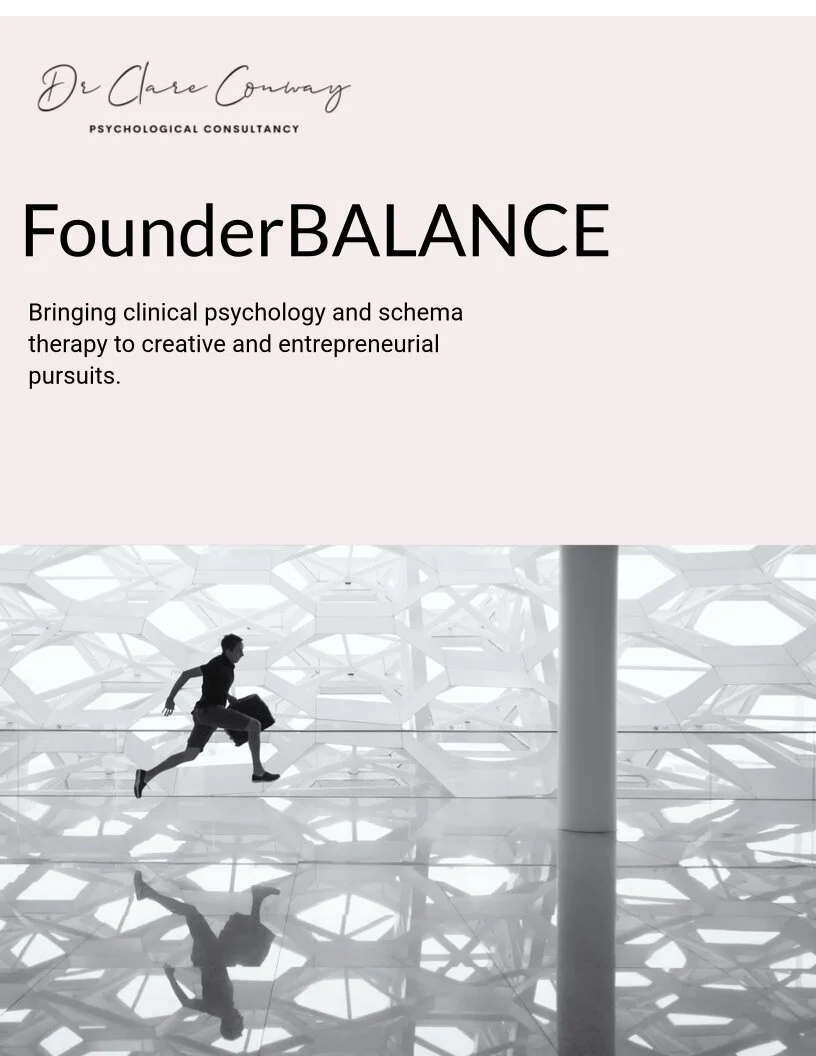
We all have the capacity to form healthier relationships.
“Schema Therapy provides a repairing attachment experience from which growth and change are possible.”
- Dr Clare Conway
Schema Therapy
Schema Therapy is an integrative therapy combining CBT, psychoanalytic object relations theory, and gestalt experiential techniques. Unlike other models, Schema Therapy places a strong emphasis on the therapeutic relationship, using a form of ‘limited re-parenting’ to resolve unmet and frustrated needs of childhood.
What are schemas?
Schemas, also termed early maladaptive schemas (EMS), are extremely stable, enduring, negative patterns of thinking and feeling, which include memories and bodily sensations. Schemas are activated and emotional distress is felt when we are triggered by an event in the present which is reminiscent of original schema-forming events.
There are 18 schemas in total. Some individuals may only develop a couple of schemas, whilst others may have all 18. Schemas include primary schemas such as ‘Abandonment’, ‘Emotional Deprivation’, and ‘Mistrust’; and secondary conditional schemas, which develop in response to the original schemas. These include ‘Approval-seeking’, Self-sacrifice’ and ‘Unrelenting Standards’.
Schema processes are mostly automatic and outside of conscious control. As we may have very limited awareness of how our schemas affect us, we may be puzzled by our own reactions, which may take the form of gradual or sudden shifts in mood or feelings, or behaviour or repeated behaviour which is obviously self-defeating or destructive. Schema Therapy works to bring these unconscious processes and life traps to more conscious awareness so that we can begin to make changes.
How do schemas develop?
Schemas communicate the circumstances of our early environment and relationships and the interaction of our temperament with early experiences. Unmet childhood needs, childhood abuse, neglect, over-indulgence and parental modelling, all play a role in the development of schemas.
If, for example, an individual’s childhood is characterised by instability either through parental separation, alcoholism, loss, or abandonment, an ‘Abandonment/Instability’ schema may develop. If, during development, this same individual learns that the only way to keep significant others close and interested is to please the other, an ‘Approval-seeking’ and/or a ‘Self-sacrifice’ schema may develop. This person may learn that it isn’t safe to express their true feelings or that others are too preoccupied or unavailable to attend to their needs, so they learn to inhibit their emotions (‘Emotional Inhibition’ schema), to deny their true feelings or needs (‘Subjugation’ schema), to overeat (‘Insufficient self control’ schema) or to rescue others (‘Self-Sacrifice’ schema). Others may cope with early experiences of instability and unpredictability through overcompensatory strategies, as is seen in the ‘Perfectionist-Over Controller’ schema coping mode, where excessive control, order and perfection are sought to cope. These individuals may become workaholics (‘Unrelenting standards’ schema), highly driven and focussed on goals and results; suffering longer-term relational, emotional and physical health costs.
How does Schema Therapy work?
Most schemas reside within the Vulnerable Child Mode so schema therapy works to reach this younger part of self. Schema therapy also works to diminish the strength of the inner critic (Punitive and Demanding Parent modes), and to develop healthier adult coping so that maladaptive patterns of coping in response to schema activation can be relinquished. A range of cognitive, relational, and emotion-focused experiential techniques are used including imagery re-scripting and chair work. In many cases however the core vehicle of change is the therapy relationship itself rather than any one technique.
What difficulties can be helped by schema therapy?
There is an established evidence base for schema therapy in a range of complex clinical issues, including:
Severe & recurrent depression
Anxiety disorders
Bipolar disorder
Substance misuse & addictive behaviours
Obsessive compulsive disorder
Intimacy & relationship issues
Narcissism
Eating disorders
Personality disorders
Schema therapy is also effective for anyone seeking to address:
Self-defeating life patterns/traps (workaholism, procrastination, comfort eating etc.)
Intimacy fears
Abandonment anxiety
Relationship traps - ‘schema chemistry”
Long-standing mood regulatory difficulties
Chronic feelings of shame and worthlessness
Imposter syndrome & perfectionism
Narcissistic self-reliance
Anger, rage & irritability
A core unmet need for stability is in the histories of many individuals who present for therapy
“Schema therapy provides the stability necessary to make changes in other areas of your life.”
- Dr Clare Conway
Worried you spend too much time online scrolling?
An unhealthy relationship with our phone or other devices can reflect a need for connection or greater stimulation in other areas of our life.

Schema Therapy is a key component in the psychological framework behind Dr Conway’s tailored entrepreneurial and creative mental health services.
Bringing a healthier self to your business choices
Learn to break self-sabotaging life traps and stop self-limiting schema-driven decision-making.

